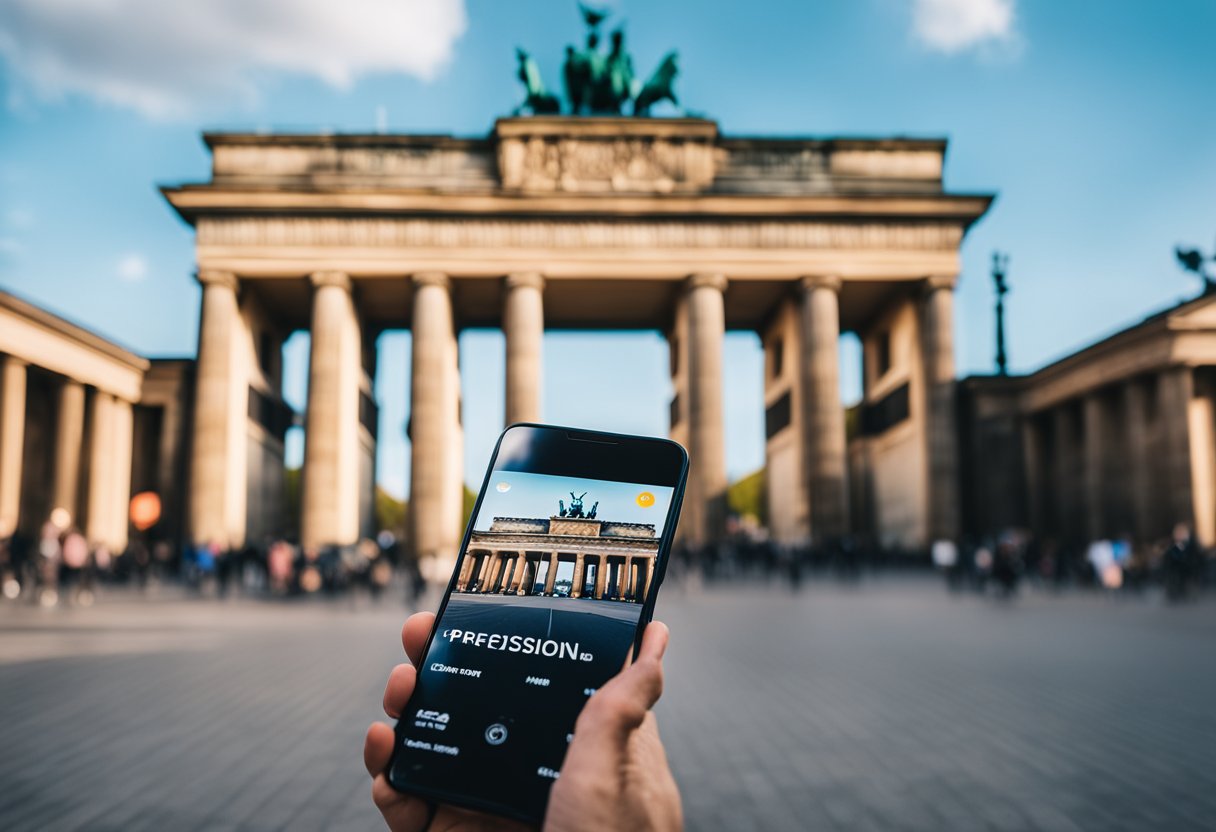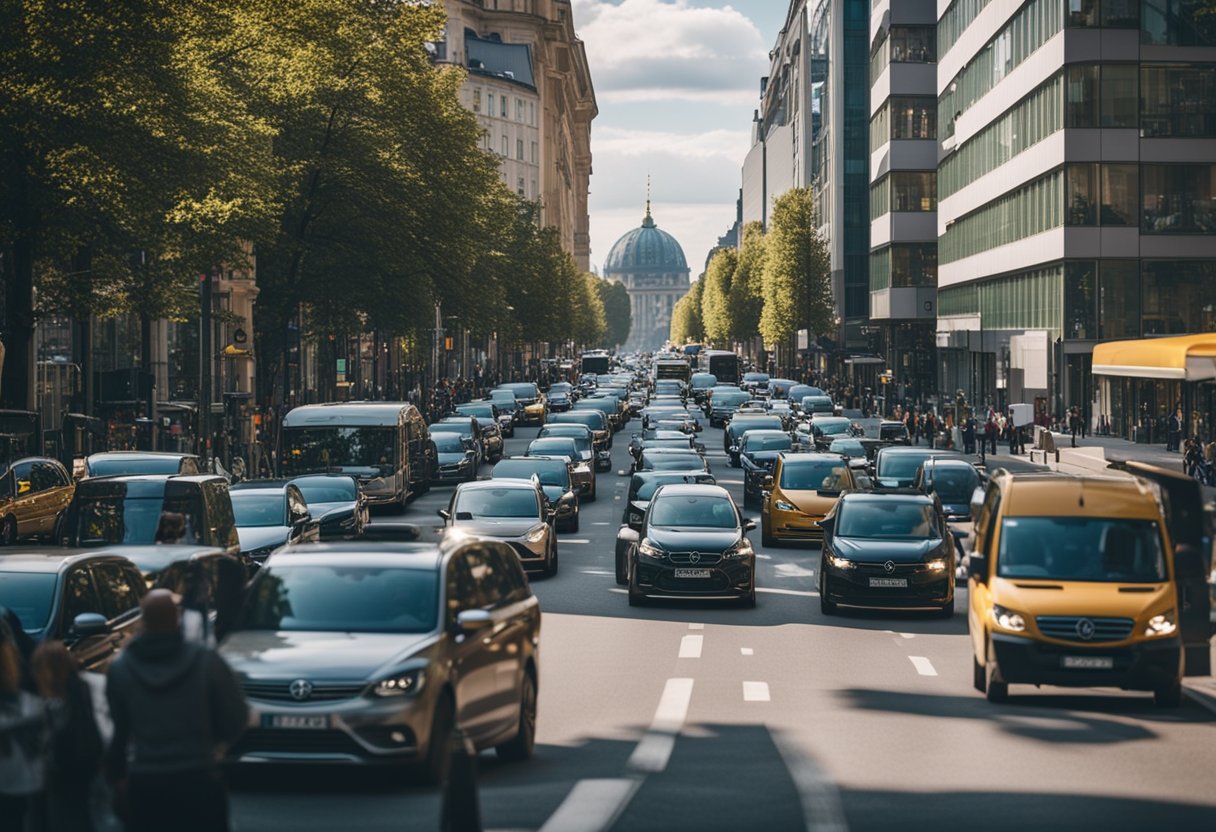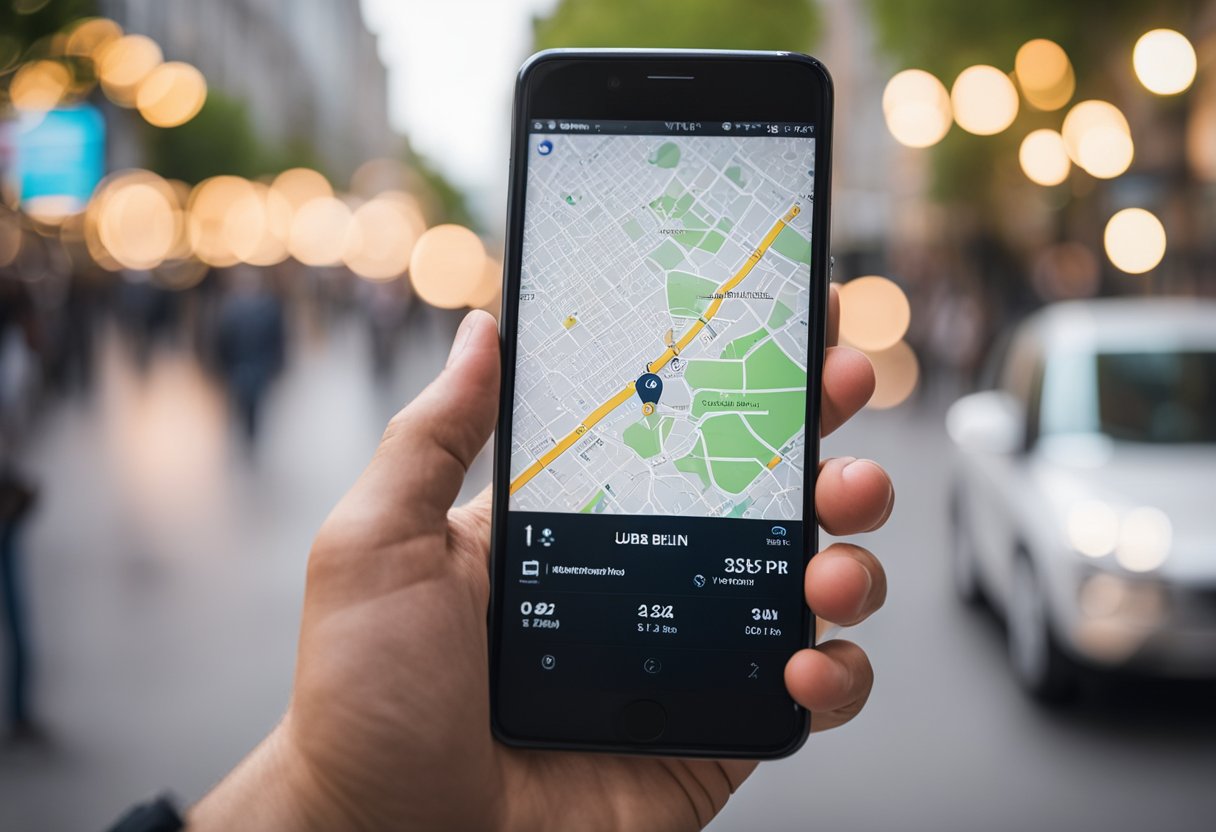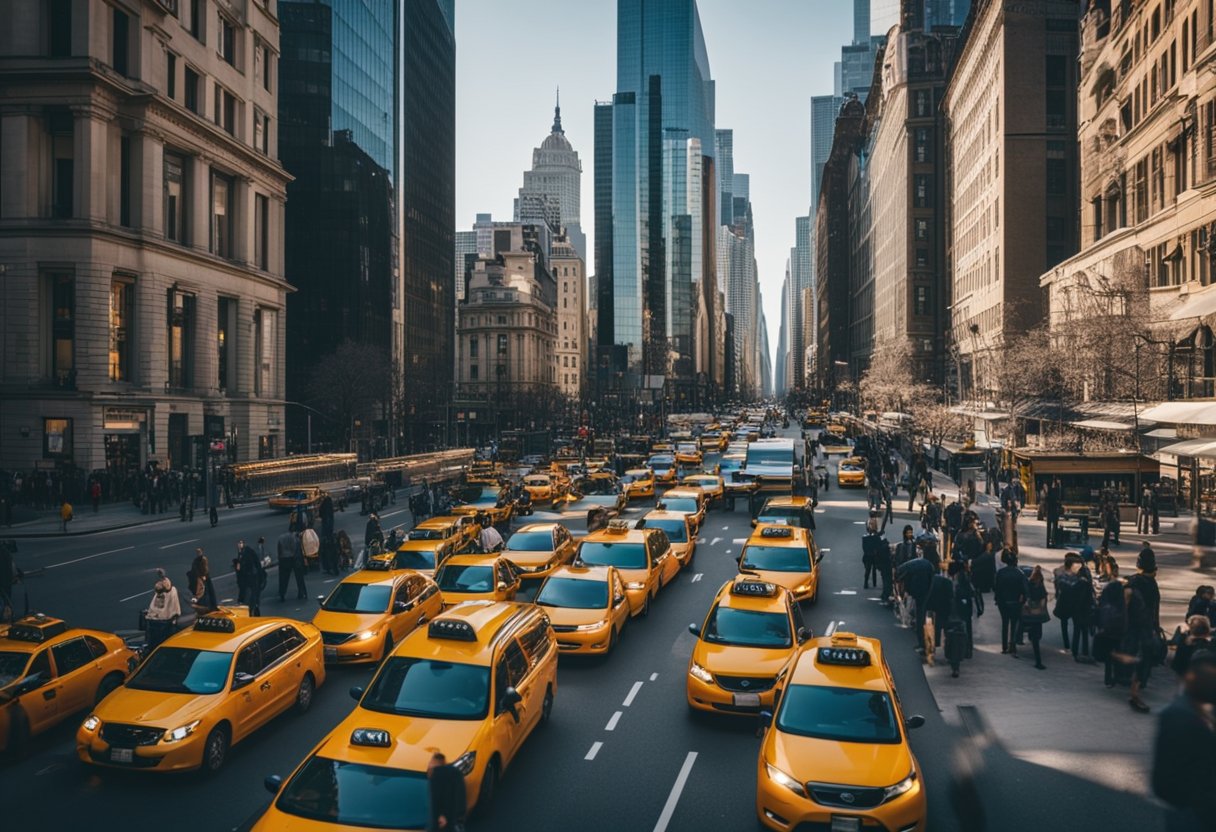Traveling in Berlin, Germany raises the question of whether ride-hailing services like Uber or Lyft are available for navigating the city.
Uber does operate in Berlin, offering several ride options, including UberX, UberXL, and even Premium and Green rides.
They provide a cashless service where the rider can see the driver’s details like photo, name, and license plate number beforehand, ensuring a transparent and secure journey.
Lyft, however, does not have a presence in Berlin or anywhere else in Europe as of now. Instead, passengers can rely on other local ride-hailing services or make use of Berlin’s extensive public transportation network, which is known for its efficiency and coverage.
The availability of Uber has made it convenient for residents and tourists alike to get around the city, although they had to adapt to specific regulations and operate within the legal framework set by the German government.
Ride-Hailing Services in Berlin
Berlin offers a range of ride-hailing services, despite certain limitations. The city’s regulatory framework shapes the availability and operation of these services.
Overview of Uber and Lyft Availability in Berlin
Uber is present in Berlin, providing licensed ride-hailing options like UberX Professional. However, it’s important to note that Lyft does not operate in Germany or anywhere in Europe.
Services similar to Uber’s standard offerings in other cities have been adapted to comply with German regulations, ensuring that all drivers are appropriately licensed.
Local Alternatives to Uber and Lyft
Apart from Uber, there are local alternatives offering ride services. Free Now (formerly mytaxi) is a popular app that allows users to book taxis and licensed private hire vehicles. This app is widely used in Berlin and across Germany, acting as a primary alternative to traditional taxis and Uber.
Comparison With Traditional Taxis
Traditional taxis are a reliable transport option in Berlin. They can be hailed on the street, called directly, or booked through apps like Free Now.
When comparing costs and availability, Uber may offer competitive pricing, but traditional taxis benefit from having a ‘Beförderungspflicht,’ meaning they are obliged to serve customers as long as the trip is within their operating area and no longer than 50 kilometers.
Transportation Options in Berlin
Berlin offers a diverse range of transportation options for visitors and residents, including a comprehensive public transport system, car rentals and sharing services, as well as biking and walking paths for those looking to explore the city at a slower pace.
Public Transportation Overview
Berlin’s public transportation is efficient and widely used, featuring an extensive network of buses, U-Bahn (subway), S-Bahn (suburban trains), and trams.
The U-Bahn and S-Bahn systems connect all major areas of the city and even extend out to the surrounding regions, including routes to the airport. Tickets can be purchased for single journeys, or visitors can opt for a day pass for unlimited travel.
Car Rentals and Car Sharing
For those preferring private transportation, car rental agencies are available at the airport and throughout Berlin.
In addition to traditional car rentals, Berlin also embraces car sharing, with a number of companies offering services that allow users to rent cars for short periods of time, providing a flexible alternative to owning a vehicle for getting around Berlin.
Biking and Walking
Berlin is recognized for being a bike-friendly city with dedicated bike lanes and bike rental facilities available, making cycling a pleasant and practical mode of transport. Additionally, the city is walkable, with numerous pedestrian zones and walking tours, allowing visitors to take in the sights at their own pace.
Uber’s presence in Berlin is noted, providing another mode of transportation for residents and tourists. However, it is important to mention that unlike in many other cities, the availability of Lyft has not been established in Berlin.
User Experience With Ride-Hailing Apps
Those utilizing ride-hailing applications in Berlin, Germany, will find a range of experiences pertaining to app features, service consistency, and security measures. With Uber having a presence and Lyft being absent, it’s essential to account for these factors when considering transportation options.
App Functionality and User Interface
When using Uber, riders in Berlin benefit from a familiar interface and functional simplicity. The app allows users to easily choose from different service types, such as UberX, with just a few taps.
On the other hand, the FREE NOW app, formerly known as mytaxi, also offers a streamlined user experience, extending its service beyond regular taxis to include electric scooters and e-bikes.
Service Quality and Reliability
Uber’s service in Berlin is known to be reliable, with prompt pickups and an extensive network that covers most of the city.
Meanwhile, FREE NOW is acclaimed for its large network and multimodality, integrating traditional taxi services, which are deeply embedded in the local transportation fabric. Users often enjoy a high standard of service quality, with clean vehicles and professional drivers.
Safety and Support
Safety is a prime consideration for riders, and Uber provides various safety features, including ride tracking and driver identification. Support channels are readily accessible via the app for any concerns that may arise during a trip.
Similarly, FREE NOW prioritizes safety by ensuring all drivers are licensed and vehicles meet rigorous safety standards. The support with local providers is typically robust, as they adhere to stringent German transport regulations and customer service standards.
Pricing and Payment Methods
When considering transportation options with Uber in Berlin, Germany, passengers should assess pricing structures and the payment methods available to them.
Cost Comparison
Uber operates in Berlin, offering competitive pricing compared to standard taxis and other transport services. Unlike traditional cabs, where fares can be influenced by external factors like traffic, Uber’s pricing is generally calculated upfront.
This provides riders with the assurance of knowing the cost before they confirm their ride. It’s important to note, however, that dynamic pricing may apply during times of high demand, affecting the overall fare.
Payment Options Available
Uber’s payment system is designed for convenience, allowing customers to pay electronically through the app. Several payment options are available, such as credit cards, debit cards, and even PayPal.
This flexibility ensures that users can choose their preferred payment method without needing cash. Moreover, electronic receipts are provided to help riders keep track of their expenses easily.
Operational Challenges in Berlin
In Berlin, the presence of ride-sharing services such as Uber has been met with considerable legal hurdles and traffic complications. These issues underscore the difficulty of operating within the city’s strictly regulated transportation sector.
Legal Restrictions and Compliance
In Germany, Uber has faced significant legal challenges, particularly due to the country’s stringent transportation laws. A German court ruled that the Uber app was illegal as it circumvented registered taxi operations.
The legislation mandates that all drivers must possess a chauffeur’s license, which is a strict requirement that applies to the entire country.
Consequently, the model of amateur freelance driving, common to Uber’s operation in other countries, is not permissible in Berlin. This highlight by The German Way & More delineates the legal complexities faced by Uber in Germany.
As for Lyft, it is currently non-operational in Berlin. Ride-sharing companies must adhere to a highly regulated market, where all drivers are obligated to be trained and hold a certification.
This ensures that only those compliant with the rigorous standards of public transportation serve Berlin’s populace.
Dealing With Traffic and Congestion
Traffic and congestion in a bustling metropolis like Berlin present another set of operational challenges for ride-sharing services like Uber. Efficient navigation and timely service are essential in the capital city, known for its dense traffic.
To maintain a reliable service, Uber must strategize extensively to circumvent these challenges, ensuring customers are transported efficiently despite the heavy urban traffic.
This operates within the broader context of Berlin’s comprehensive transit system, where competing with established services means maintaining high standards of punctuality and convenience.
Special Features and Services
In Berlin, Germany, Uber provides several tailored services to meet the unique needs of the city’s residents and visitors, including pet-friendly rides and accessible options for travelers seeking additional comfort or requiring specific accommodations.
Rides for Passengers With Pets
Uber offers a ride option for passengers traveling with their pets in Berlin named Uber Pet. This service ensures that riders can bring their furry friends along with them with prior notice to drivers who are comfortable accommodating pets in their vehicles.
Options for Increased Comfort
For a more comfortable ride, Uber presents the Uber Comfort tier in Berlin. It guarantees newer car models with additional legroom, catering to passengers who prefer a more spacious and refined environment during their travel.
Accessibility Services
Uber commits to providing accessibility services by offering Wheelchair Accessible Vehicles (WAV). These options enhance the experience for passengers with mobility challenges, ensuring a comfortable and suitable travel option in Berlin.
Safety and Regulations
In Berlin, Germany, the operation of ridesharing services such as Uber relies on adherence to established regulations. These include driver and vehicle safety standards, proper insurance and liability measures, and strict drug and alcohol policies to safeguard passenger security.
Driver and Vehicle Standards
Uber ensures that all drivers undergo thorough background checks and possess the proper licensing to operate passenger transportation services in Berlin. Vehicles used for Uber rides need to meet safety requirement criteria and undergo regular inspections to ensure they are roadworthy and safe for passengers.
Insurance and Liability
For insurance coverage, Uber provides a comprehensive policy that covers both drivers and passengers during an Uber trip. Liability insurance is essential as it protects all parties in the event of an accident, allowing for compensation for any potential damages or injuries.
Drug and Alcohol Policies
Uber implements stern drug and alcohol policies, conforming to German regulations. Drivers are strictly prohibited from operating under the influence of alcohol or drugs, ensuring the safety of passengers is not compromised. Any violation of these rules can result in immediate suspension or permanent removal of the driver from the Uber platform.
Exploring German Cities
In examining the ease of getting around German cities, one can’t help but consider the availability of ride-hailing services such as Uber. While traditional taxis have long been a staple, these modern platforms offer an alternative worth exploring for travelers.
Ride-Hailing Options in Other Cities
While Uber does operate in several German cities, its presence varies by location. In Berlin, the service runs with some limitations; however, those visiting other major cities like Munich, Frankfurt, Hamburg, or Stuttgart’ll find Uber a viable way to navigate the urban landscape.
Each of these cities offers a tailored Uber experience that complies with local regulations, ensuring that travelers have access to convenient transportation options. Lyft, on the other hand, is not available in Berlin as it has not established operations anywhere in Europe.
Cross-City Travel and Trips
When planning trips across cities in Germany or even to neighboring destinations like Prague, the transportation options vary. Train and bus services provide comprehensive and reliable travel networks across Europe, suitable for longer distances between cities.
For more direct and private travel, renting a car might be a preferred option for some travelers. At the same time, Uber can facilitate shorter, intra-city travel in cities where it is available, for cross-city travel, especially when exploring beyond the country’s borders, traditional options like trains and cars might be more practical and efficient.
Convenience Stores and Quick Stops
In Berlin, a multitude of convenience stores provide residents and visitors with easy access to everyday items. Among the most prominent chains are Aldi and Rewe, offering a broad range of products from groceries to household goods.
Aldi is known for its cost-effectiveness and efficiency, often preferred by those seeking affordability without compromising on quality. On the other hand, Rewe caters to a more diverse inventory, including a larger selection of organic and branded products.
For personal care and health essentials, dm-Drogerie Markt, simply known as dm, serves as a one-stop shop. It stocks a vast array of beauty products, dietary supplements, and drugstore needs.
While navigating through the bustling streets of Berlin, visitors may wonder about transportation services like Uber. It is noteworthy that Uber does offer services in Berlin, providing another layer of convenience for getting around the city. However, Lyft has not established operations in Berlin.
Here’s a quick glance at what these stores offer:
| Store | Product Categories | Notes |
|---|---|---|
| Aldi | Groceries, beverages, household items | Highly affordable, limited frills |
| Rewe | Groceries, organic items, international cuisine | Wide variety, slightly higher priced |
| dm | Health, beauty, household, pet supplies | Extensive range of personal care products |
Travelers exploring Berlin will find that they have easy access to these amenities, thereby ensuring that their immediate needs can be met swiftly, whether it’s grabbing a quick snack from Aldi or picking up travel essentials at dm.
Additionally, with Uber’s presence, they can effortlessly reach these locations, further adding to the city’s appeal as a destination that champions convenience and efficiency.
Frequently Asked Questions
Travelers often inquire about the availability of ride-sharing services in Berlin. This section addresses common questions regarding Uber, Lyft, and alternative transportation options within the city.
Which ride-sharing services are available in Berlin?
Berlin offers several ride-sharing services, including Uber, which is operational within the city. However, there is a notable absence of Lyft.
Can I use my Uber app in Berlin, Germany?
Visitors can use the Uber app seamlessly in Berlin as the service is integrated into the city’s transportation network.
Are there any differences in cost between taking a taxi and using Uber in Berlin?
The cost can vary between traditional taxis and Uber in Berlin, with Uber often providing competitive pricing, especially during non-peak hours.
What are the alternatives to Uber and Lyft for getting around in Berlin?
Apart from Uber, travelers can choose from other services, such as traditional taxis, bike-sharing, and public transportation for moving around Berlin.
Is Uber operational at Berlin’s airports for pick-up and drop-off?
Uber services are available for airport pick-up and drop-off at Tegel and Schönefeld airports, facilitating convenient travel to and from the city.
In which German cities is Uber available?
Uber has expanded its presence across several German cities, including Berlin, Munich, Frankfurt, and Düsseldorf.





